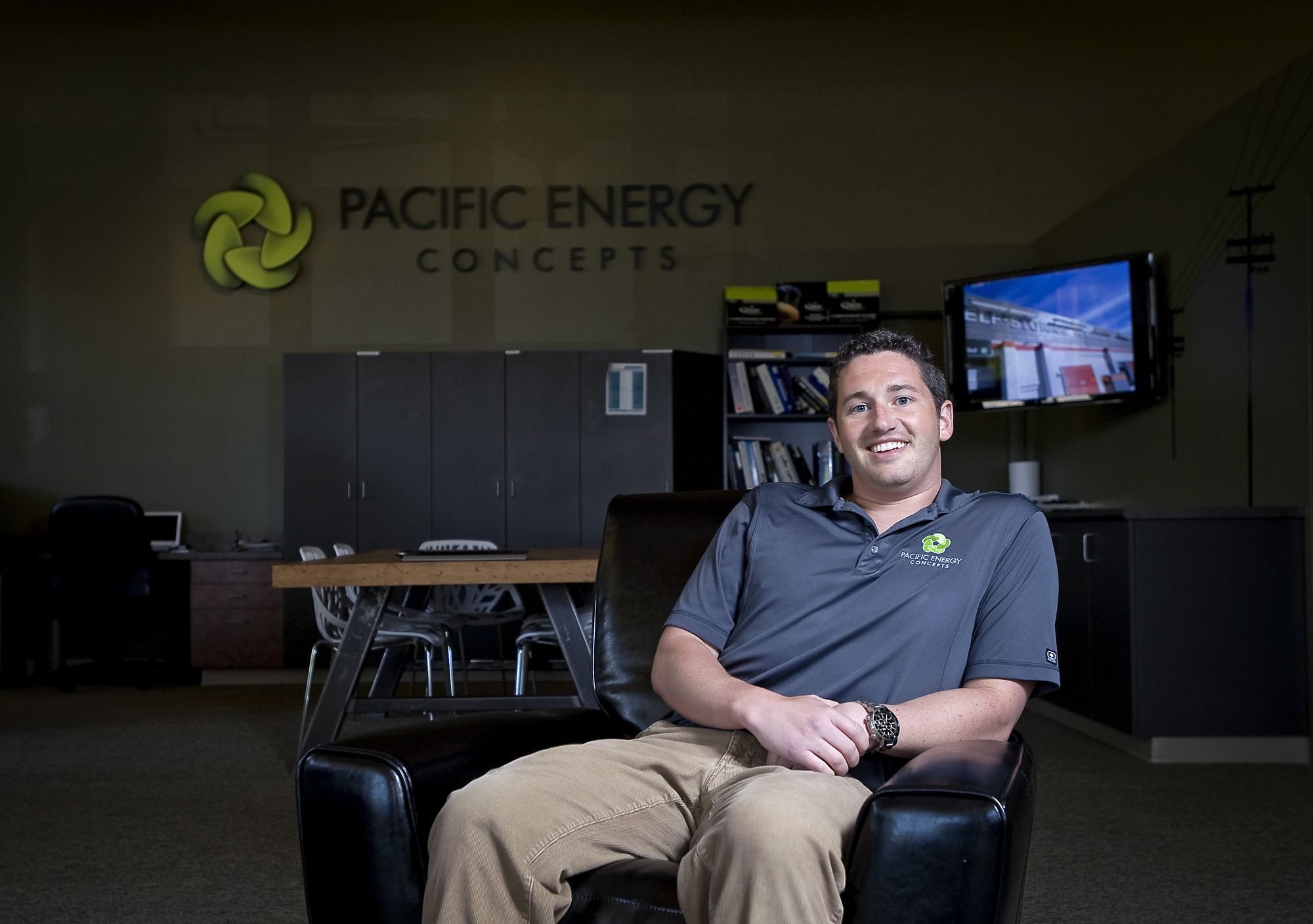What: Energy conservation and consulting, with a focus on industrial and commercial lighting.
CEO: Keith Scott
Address: 210 W. Fourth St., Vancouver
Contact: 360-571-3200
Just off West Fourth Street in Vancouver, capitalism and environmentalism are getting along swimmingly thanks to Keith Scott, a 29-year-old CEO with big ambitions and the hard-won sales experience to back them up.
Inside the offices of Pacific Energy Concepts — the green business he launched in the summer of 2009 — Scott looks you in the eye, pumps your hand and quickly makes room for easy small talk.
Then it’s onto his energy conservation and consulting company, which aims to cut the utility bills of industrial and commercial businesses by installing high-efficiency lighting systems.
One moment, Scott points out how many kilowatt hours he can save you, basking in the fact that he’s helping others conserve energy, doing something good for the planet.
The next moment, he’s back down to earth. The worrier emerges. “I have to sometimes check myself,” he said. “I’m a business owner. I’ve got to focus on the profitability of the company to keep it healthy.”
Welcome to the world of the green entrepreneur. Scott’s business experience reveals one pathway to starting your own company. That his business is viable speaks to a larger fact: Energy conservation can fit just as snugly in a business plan as it does in a regulator’s rule book.
Pacific Energy Concepts is growing. What began as a one-man shop now has five employees. The company’s revenue goal in 2010 was $800,000; it brought in $2 million. This year, Scott is shooting to double the company’s revenue to $4 million. The company is profitable, he said. “I’m not satisfied,” he added. “I’m setting up very, very aggressive goals.”
He set aggressive goals even before going into business for himself.
Scott, a graduate of Vancouver’s Mountain View High School who holds a bachelor’s degree in biology and communications from Washington State University, maintained a relentless pace when he was a sales representative for publicly traded Cintas Corp., which supplies uniforms, among other specialized services, to businesses.
He started that job in 2005 and, over two years, picked up some important insights. He learned what motivates companies to spend money. He learned to sell a product based on the value it would bring to a company rather than on how good it was in and of itself.
But he wanted to do something more than just serve the bottom line. That led him to search in the burgeoning field of energy conservation.
Eventually, he landed a job as a sales executive with Orion Energy Systems Inc., the Manitowoc, Wis.-based designer and manufacturer of primarily energy-efficient lighting systems, controls and other related services.
Scott’s work as the company’s only sales representative in Oregon got noticed, and his territory was expanded to include Washington.
The Orion job was Scott’s launching pad to his ultimate goal: running his own company. With Orion’s blessing, he founded Pacific Energy Concepts in 2009. Scott’s new company also served Orion’s aim to set up partnerships in key metro areas that would help promote and move Orion’s products to more people. Pacific Energy Concepts purchases its lighting supplies primarily from Orion.
Scott, who used some of his own money to open his company, has built up his customer base by cold-calling businesses, landing jobs — both small and large — and doing what he says he’ll do.
Scott said he focuses on tailoring new lighting systems to meet a company’s specific needs. He conducts comprehensive energy audits. He also spells out for customers how soon they’ll recoup their investment in a new lighting system.
Scott manages projects from design through to installation, and fills out all the paperwork involved in enabling customers to take advantage of incentive programs aimed at boosting energy conservation. Projects can range in cost from a couple thousand dollars to replace a group of lights for one building to hundreds of thousands of dollars to install large-scale lighting systems that use motion sensors.
Finding a niche
Scott said he’s serving customers stretching from Eugene, Ore., to Seattle. The company recently finished a project for Vancouver’s Columbia Machine Inc., which specializes in building automated equipment that helps large companies stack consumer products for shipping.
That project replaced more than 1,300 internal and external lights for Columbia Machine, saving more than $6,600 on the company’s monthly utility bill.
Mike Porter, manager for the Northwest Trade Ally Network, which helps businesses participate in lighting-efficiency incentive programs, said it’s a good time for Scott to be in his chosen business.
Federal regulations are changing to phase out old, inefficient lighting. “There’s a lot of inefficient lighting in commercial and industrial establishments,” Porter said. “It’s definitely a market niche.”
There are potential challenges. How, exactly, do you grow a niche business? What if the economy improves, and businesses are no longer so concerned about pinching pennies on their utility bills? And what do you do when a business sees new lighting as a luxury rather than a necessity?
Scott said he believes the issue of energy conservation is here to stay. “We can only produce so much energy, and we are consuming more and more every day,” he said.
When Scott considers the future of Pacific Energy Concepts, he sees positive developments. He hopes to hire more people by the end of this year. He said he feels good about what he’s doing — running a business and helping out in a larger cause.
And he’s only just begun. “I feel like our reach is going to extend,” he said.





